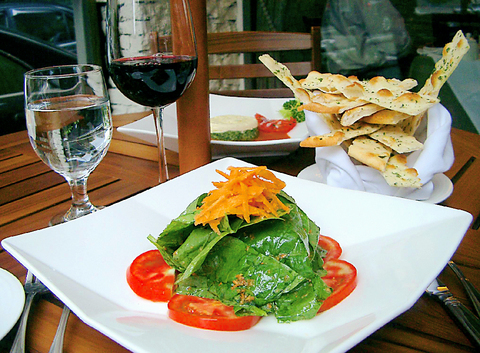Luna d'Italia offers a comfortable atmosphere and quality Italian food. Chef and owner Daniele Gerbino comes from Sicily originally, but worked as a chef in Italy for more than a decade, including at Michelin three-star restaurants in Florence. Three years ago he traveled to Taiwan to visit his chef brother. In the beginning he was attracted by Taipei's energetic nightlife, but eventually settled down and employed his cooking skills.
Gerbino's Taiwanese wife, Jo Chou (周孟潔) is an interior designer. Her design for this restaurant is a beige-color floor and white brick wall with a vintage feel. The simple and elegant lighting design somehow gives the small house with 30 seats an illusion of plenty of space. Customers may sit closer to each other than in bigger restaurants, yet they won't feel crowded.
The food prepared by Chef Gerbino is a mixture of Italian regions, including Milan, Sicily and Florence cuisine, and of course there are plenty choices of pastas and pizzas. Spinach souffle cake in fresh tomato sauce and octopus with potato are two original starters. The former is a refined blend of spinach, cream and baked high quality mozzarella cheese. The latter has the refreshing taste of octopus, with thin slices of potatoes and herbs. Gerbino is meticulous about the use of herbs, insisting on using fresh organic herbs and not dry bottled ones.

PHOTO: YU SEN-LUN, TAIPEI TIMES
For the main course, I recommend the Milano-style Ossobuco in tomato sauce and the lamb stew. Both contain rich sauces and tender meat. There are 14 choices of pastas and the hand-made gnocchi dishes are must-tries. Gnocchi here is made in a portion of three-quarters potato and a quarter of flour, which makes for a smooth taste. The gnocchi with shrimp and zucchini and gnocchi with gorgonzola cheese are two popular items.
Gerbino also puts much emphasis on his selection of drinks. The high quality Italian red wine Carpineto 1999 is only NT$1500 a bottle. Nero d'Avola is a bottle of Sicilian red wine that is very fruity and has a fragrance of chestnuts, NT$1000 a bottle. As for white wine, Gerbino recommends Gavi 2004, which is NT$1350 a bottle. There are also dessert wine drinks such as grappa, sambuca and limoncello.
The restaurant is just three months old, but has been packed during weekday lunch hours and weekends since it opened.

On April 26, The Lancet published a letter from two doctors at Taichung-based China Medical University Hospital (CMUH) warning that “Taiwan’s Health Care System is on the Brink of Collapse.” The authors said that “Years of policy inaction and mismanagement of resources have led to the National Health Insurance system operating under unsustainable conditions.” The pushback was immediate. Errors in the paper were quickly identified and publicized, to discredit the authors (the hospital apologized). CNA reported that CMUH said the letter described Taiwan in 2021 as having 62 nurses per 10,000 people, when the correct number was 78 nurses per 10,000

As we live longer, our risk of cognitive impairment is increasing. How can we delay the onset of symptoms? Do we have to give up every indulgence or can small changes make a difference? We asked neurologists for tips on how to keep our brains healthy for life. TAKE CARE OF YOUR HEALTH “All of the sensible things that apply to bodily health apply to brain health,” says Suzanne O’Sullivan, a consultant in neurology at the National Hospital for Neurology and Neurosurgery in London, and the author of The Age of Diagnosis. “When you’re 20, you can get away with absolute

May 5 to May 11 What started out as friction between Taiwanese students at Taichung First High School and a Japanese head cook escalated dramatically over the first two weeks of May 1927. It began on April 30 when the cook’s wife knew that lotus starch used in that night’s dinner had rat feces in it, but failed to inform staff until the meal was already prepared. The students believed that her silence was intentional, and filed a complaint. The school’s Japanese administrators sided with the cook’s family, dismissing the students as troublemakers and clamping down on their freedoms — with

As Donald Trump’s executive order in March led to the shuttering of Voice of America (VOA) — the global broadcaster whose roots date back to the fight against Nazi propaganda — he quickly attracted support from figures not used to aligning themselves with any US administration. Trump had ordered the US Agency for Global Media, the federal agency that funds VOA and other groups promoting independent journalism overseas, to be “eliminated to the maximum extent consistent with applicable law.” The decision suddenly halted programming in 49 languages to more than 425 million people. In Moscow, Margarita Simonyan, the hardline editor-in-chief of the